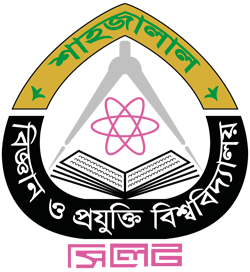Shahjalal University of Science and Technology
Faculty Profile

Md Abdul Halim
Associate Professor
Contact Information
- Office Address: Associate Professor Institute of Shahjalal University of Science and Technology, Sylhet-3114, Bangladesh
- Phone: +8801714078386
- Email: halim10-fes@sust.edu
Biography
Dr. Halim is a biometeorologist who holds a Ph.D. from the University of Toronto (2020), where his research focused on the biogeophysical and biogeochemical implications of post-fire and post-harvest boreal landscapes. Additionally, he investigates the potential of biochar as a tool to mitigate climate change. His overarching objective is to explore biometeorological phenomena and contribute to the development of 'climate-smart' strategies in a range of managed ecosystems, from tropical to boreal environments.
Prior to earning his Ph.D., Dr. Halim obtained his B.Sc. and M.Sc. degrees in Forestry from the Department of Forestry and Environmental Science at Shahjalal University of Science and Technology in Bangladesh. Since 2009, he has held a position as a faculty at the same institution.
Faced with resource challenges in teaching and research in Bangladesh, Dr. Halim has turned to open-source educational and learning materials, becoming both a user and proponent of these resources. His commitment to this approach includes active contributions toward the expansion and refinement of open-source resources.
Education
- Ph.D. in Biometeorology (with distinction) (University of Toronto)
- M.Sc. in Forestry (with distinction) (Shahjalal University of Science and Technology)
- B.Sc. in Forestry (with distinction) (Shahjalal University of Science and Technology)
Research Interests
- Climate change
- Biometeorology
- Biogeochemistry
- Forest ecology & management
- Urban climatology
- Remote sensing & GIS
- Artificial intelligence
- Biochar
- Designing cost-effective environmental sensor-logger systems
Active Research Project
- Patterns and drivers of stem and foliage methane fluxes from an upland tropical forest in Bangladesh.
- A deep-learning strategy to determine point-source emissions of methane in urban settings from satellite data.
Previous Research Project
- Protecting ecosystems and livelihoods of the Sundarbans, a World Heritage site: Assessing the impact of natural hazards on forest-based ecosystem services.
- Unlocking the potentials of Sundarbans mangrove forest as a nature-based climate solution.
Journal Publish
- 1. Greenhouse gases and green roofs: carbon-dioxide and methane flux in relation to substrate characteristics.
- 2. Biochar effects on soil physiochemical properties in degraded managed ecosystems in northeastern Bangladesh.
- 3. Land sparing can maintain bird diversity in northeastern Bangladesh.
- 4. Stand age and species composition effects on surface albedo in a mixedwood boreal forest.
- 5. Biochar enhancement of facilitation effects in agroforestry: early growth and physiological responses in maize-leucaena model system.
- 6. A proxy-year analysis shows reduced soil temperatures with climate warming in boreal forest.
- 7. Comparative responses of early successional plants to charcoal soil amendments.
- 8. Characterizing the diameter distribution of sal plantations by comparing Normal, Lognormal, and Weibull distributions at Tilagarh eco-park, Bangladesh.
- 9. Density, diversity, composition, and distribution of street trees in Sylhet metropolitan city of Bangladesh.
- 10. An allometric equation for estimating stem biomass of Acacia auriculiformis in the northwestern region of Bangladesh.
- 11. A diagnosis of existing logging bans in Bangladesh.
External Affiliations
- Research Fellow, University of Toronto
Awards & Recognition
- Urban challenge grant, University of Toronto, 2022
- Schmidt AI in Science Fellowship, 2023
- Doctoral completion award, 2019, University of Toronto, Canada
- Graduate student award, 2017, The Centre for Global Change Science, University of Toronto, Canada
- The Rufford small grants for nature conservation, 2016, The Rufford Foundation, UK
- Jeanne F. Goulding fellowship, 2014, University of Toronto, Canada
- Connaught international scholarship for doctoral students, 2013, University of Toronto, Canada
Teaching
- Remote Sensing and GIS
- Surveying and Drawing
- Forest Mensuration and Inventory
- Research Methodology
Graduate Supervision
- Farhana Bintay Hye. 2019. Can biochar increase crop performance in arsenic-contaminated tropical soils? Shahjalal University of Science & Technology (SUST), Bangladesh.
- Nabila Hasan. 2013. Spatial distribution of plant species richness in a national park of Bangladesh. SUST, Bangladesh.
- Farzana Akhter. 2013. Relationship between forest canopy openness and canopy height with some selected soil chemical properties in a tropical forest of Bangladesh. SUST, Bangladesh.
- Shukla Sinha. 2013. Tree-habitat association in a tropical forest of Bangladesh. SUST, Bangladesh.
- Debashish Roy. 2011. Relationship between canopy openness and tree species diversity of an old-growth patch at Lawachara national park, Bangladesh. SUST, Bangladesh.
- Md Arif Ferdous. 2011. Quantification of vertical strata and structural dominance in Rema-Kalenga Wildlife Sanctuary. SUST, Bangladesh.
- Tutul Saha. 2011. Relationship of undergrowth coverage with available understory light condition measured with hemispherical photographs in Lawachara national park. SUST, Bangladesh.
- Fokruddin Ali Ahmed. 2010. Determining economically sustainable landuse practice in high Barind Tract: A case study from Porsha upazila. SUST, Bangladesh.
- Asad Ali. 2010. Quantitative structure of urban homegardens in Sylhet City Corporation. SUST, Bangladesh.
- Emran Hossain. 2010. Arsenic contamination in drinking water and impact on human health: A case from southeastern Bangladesh. SUST, Bangladesh.
- Suma Dutta. 2010. Assessment of naturalness in Khadim Nagar national park. SUST, Bangladesh.
